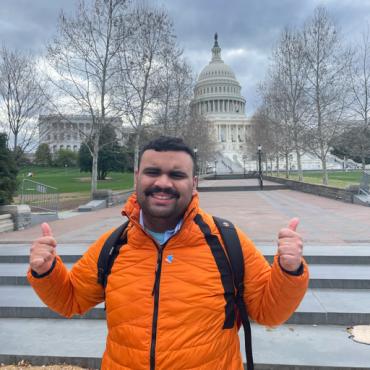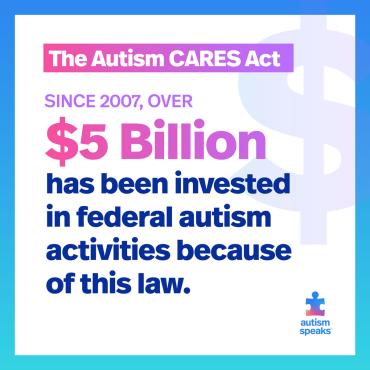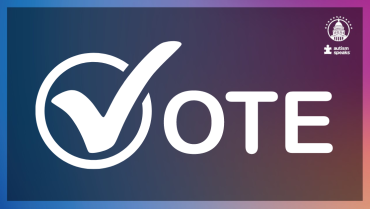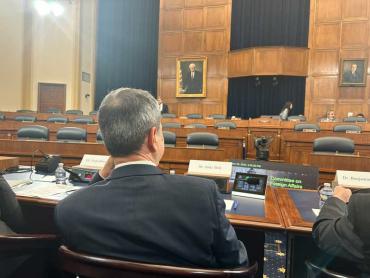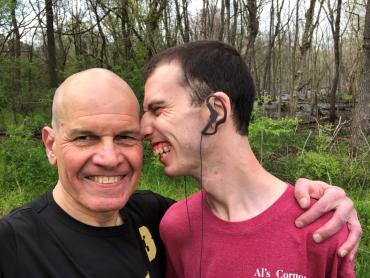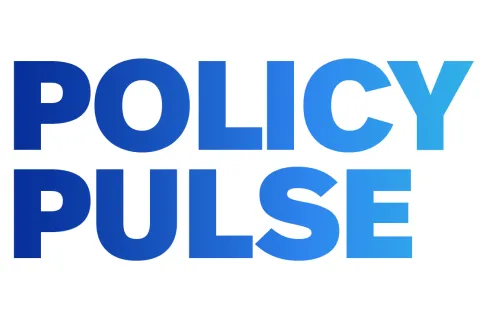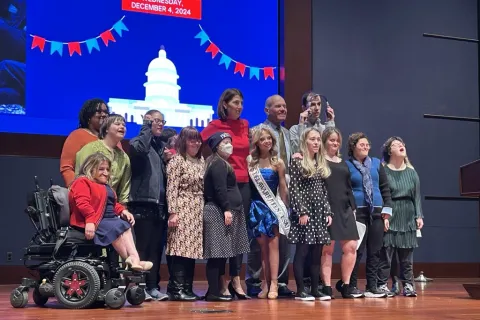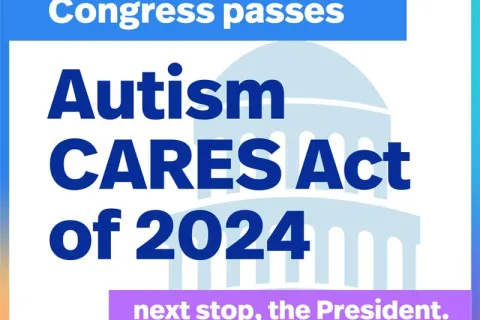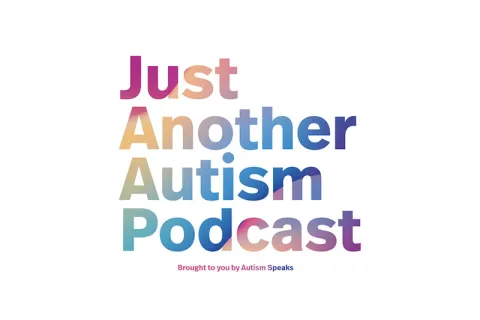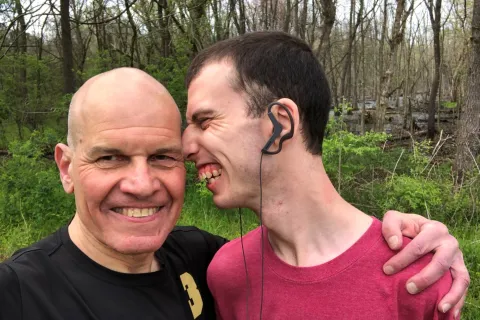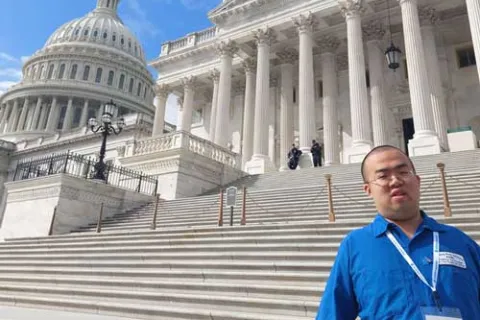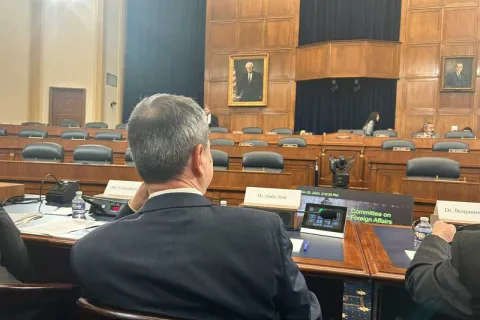2024 Advocacy Highlights
December 31, 2024Autism Speaks made tremendous strides in 2024, driving impactful change for individuals with autism and their families through advocacy. Our government affairs team worked year-round to influence policy at the state and federal government levels by working with Congress, the White House, state legislators, agencies, and regulators.
By renewing the Autism CARES Act, passing new state laws and securing millions of dollars for autism initiatives across the country, our advocacy work strengthens systems of support, services and opportunities for autistic individuals. This year’s advocacy milestones will lead to enhanced developmental disability services; protections for autistic people from discrimination, safety concerns and bullying; expanded insurance coverage of autism therapies; enhanced workforce development initiatives; improved supports for autistic students and earlier planning for postsecondary goals; increased access to transition and adult services; and more.
While this is not a comprehensive list of legislation and regulation on which we worked, we are proud to share our top advocacy highlights from 2024:
- Advocating for national autism initiatives
- Improving health outcomes
- Improving education & employment
- Enhancing lifespan supports
- Supporting caregivers
- Representing the autism community on Capitol Hill
- Sharing autism advocacy stories
Advocating for National Autism Initiatives
The Autism CARES Act of 2024
Autism Speaks is proud to have led advocacy efforts to renew and expand the Autism CARES Act. As the only federal law solely dedicated to the autism community, the Autism CARES Act has been the most important driver of investments in autism research, data and training programs, which have fueled the development of evidence-based best practices benefiting autistic individuals and their families. The new law expands programming to address some of today’s most critical gaps in autism health care and services.
Funding Federal Autism Programs
By weighing in on the federal appropriations process, we ensured that over $400 million in federal spending on autism-related programs was maintained in Fiscal Year 2024. This includes funding for innovative research programs on the biology of autism to best practices for services; training programs for future health professionals; autism prevalence monitoring; Kevin & Avonte’s Law grants that address safety and wandering prevention; and more. While Fiscal Year 2025 funding has not been finalized yet, our grassroots advocates were key to our success in securing 70 bipartisan US Representatives on a letter of support in a very short period of time. Advocates sent ~2,000 emails to congressional offices in just a few days!
Improving Health Outcomes
Access to health care
- Autism was mentioned 84 times in new rules announced by the White House to improve access to mental health care services. Autism Speaks strongly supported these efforts to increase awareness and enforcement of mental health parity, which helps improve access to and affordability of health care for autism and common co-occurring conditions.
- We secured 25 co-sponsors in Congress for the HEADs UP Act, which would improve access to behavioral, medical and dental care by designating people with I/DD as a medically underserved population.
- After input from Autism Speaks through the rulemaking process, the Department of Health and Human Services finalized two rules that ensure nondiscrimination protections and improve access to health care for autistic individuals and their families. The new regulations strengthen civil rights protections in ways that benefit health care access; language, physical and digital accessibility; and LBGTQ+ patients.
Public & Private Coverage of Autism Therapies
- In Texas, we helped secure Medicaid rate increases for Applied Behavior Analysis (ABA)
- In Ohio, after years of pressure from Autism Speaks and other advocates, new draft rules were released on the implementation of a consistent ABA benefit for children and youth enrolled in Medicaid.
- In Pennsylvania, ABA was added to the Essential Health Benefits for state marketplace plans, closing a loophole for this type of insurance plan.
- In Illinois and New York, we improved access to ABA for autistic children on Medicaid through work within the regulatory system.
- In Iowa, we helped secure Medicaid rate increases for mental health providers, including ABA providers.
Ban on Electrical Stimulation Devices
We joined other organizations in supporting a new FDA rule to ban the use of electrical stimulation devices (ESDs) as a treatment for mitigating harmful behaviors. When a bill was introduced that included a loophole for the Judge Rotenberg Center to continue this treatment, we successfully advocated in coalition with other organizations for the removal of the legislative exemption.
Improving Education & Employment
Special Education
- In California, after advocacy since 2021, we reached a compromise with the governor’s office on a new statewide standard process of transition planning to start in the first year of high school (currently the requirement is at age 16).
- In Florida, we helped fix a technical problem with a new law, so that front-line ABA staff could treat clients covered by private health insurance in public school settings.
- In Texas, we assured that $20 million in grant funding was reauthorized for public school districts to implement innovative autism programs, and new monies were secured to study best practices for assisting college students with ASD.
Employment Opportunities
We secured support in Congress for bills that incentivize hiring of and improve supports available to autistic workers. This included the Disability Employment Incentive Act, Supporting Disabled Entrepreneurs Act, and Supporting Ensuring Access to Medicaid Buy-In Programs Act. We also supported similar state-based legislation such as Iowa’s Work Without Worry Act and the Georgia as a Model Employer (GAME) Act.
Enhancing Lifespan Services
Home and Community-Based Services (HCBS)
- In California, we supported funding for the autism services branch of the state developmental disability (DD) agency and for provider rate increases. We also fought against a proposed year-long delay in previously approved funding for developmental disability service providers.
- In Connecticut, Illinois, New York and Ohio, we helped secure funding for direct service professional (DSP) wage increases.
- In Florida, we helped secure funding for waiver slots, wage increases for DSPs and waiver support coordinators, new regional employees within the DD system, and launch of a pilot program for “HCBS-like” services to those on the HCBS waitlist.
- In Georgia, we helped secure funding for an historically high number of new waiver slots as well as DSP wage increases.
- In Iowa, we helped increase DSP wages and the rent subsidy for waiver recipients. We also provided input into and connected our community with feedback opportunities for the the state’s waiver redesign project that is currently underway.
- In Massachusetts, we helped secure increased wages for DSPs.
- In Texas, we helped secure funding to increase DSP wages and for new waiver slots.
- In Virginia, we helped secure funding to eliminate or greatly reduce the waiver waiting list.
CMS finalized a new rule, Ensuring Access to Medicaid Services, to improve quality, transparency, workforce support, and data collection within HCBS. It included many of the elements for which Autism Speaks advocated in support. We also advocated in Congress for the Recognizing the Role of Direct Support Professionals Act which would help address the DSP workforce crisis.
Financial Security
We built support for federal bills that would either remove barriers that people with autism and other disabilities face when accessing financial resources or improve their ability to save without jeopardizing public benefits. These bills included the Eliminating the Marriage Penalty in SSI Act, SSI Savings Penalty Elimination Act, as well as two bills focused on expanding access to ABLE Accounts (ENABLE Act and ABLE Tomorrow Act).
Safety & Civic Engagement
- In Virginia, the Autism Advisory Council was reestablished, and we helped secure a new compulsory training for law enforcement on engaging with autistic individuals.
- When the Ban Water Beads Act was introduced, we endorsed it, supporting its goal to ban the sale of water beads —which have been involved in injuries to those with autism—that are marketed as toys.
- Autism Speaks launched the new Autism Votes Election Hub, providing autism-specific information and resources on voter registration, accommodations, the voting process, and the importance of casting your ballot.
Supporting Caregivers
- We secured 36 co-sponsors in Congress for the Autism Family Caregivers Act, which would award $50 million in grants to community-based organizations across the country that provide skills training to family caregivers of children with autism and other developmental disabilities or delays.
- We joined 167 organizations in a coalition letter led by the Rosalynn Carter Institute to President Biden, calling for the creation of a new office of Caregiver Health. The new office’s mission would be to advance the health and well-being of family caregivers across the nation through coordinating federal services, support, research, and education.
Representing the Autism Community on Capitol Hill
During our 2024 Advocacy Forum & Hill Day, 100+ volunteer advocates from 21 states and DC came together to strengthen their advocacy skills, learn from experts, build relationships, and have 105+ meetings in a single day with federal policymakers to advocate for policies that improve the lives of all individuals affected by autism.
Autism Speaks leaders also spoke to Congress about key issues:
- Autism Speaks Chief Science Officer Andy Shih testified in support of the Autism CARES Act of 2024 before the House Energy and Commerce Committee Subcommittee on Health as well as before the House Foreign Affairs Committee on global autism initiatives.
- Autism Speaks President & CEO Keith Wargo spoke on employment of individuals with disabilities and the need for greater inclusion in the workplace at a congressional briefing and subcommittee hearing of the House Small Business Committee.
- Autism Speaks Vice President of Advocacy David Sitcovsky participated in a roundtable discussion on Capitol Hill on the importance of ABLE Accounts and proposed legislation including the ENABLE Act.
Sharing Autism Advocacy Stories
- Senator Eric Schmitt shared in a Q&A about how being a father to a son with autism and tuberous sclerosis complex has impacted his career and journey as an elected official as well as his leadership of legislation like the ENABLE Act.
- Director of State Government Affairs Christa Stevens shared with Scripps News how the Autism CARES Act has supported her family in getting services & supports needed over the years.
- Former Senior Vice President of Advocacy Stuart Spielman shared how raising his autistic son motivated his advocacy on ABLE policy

